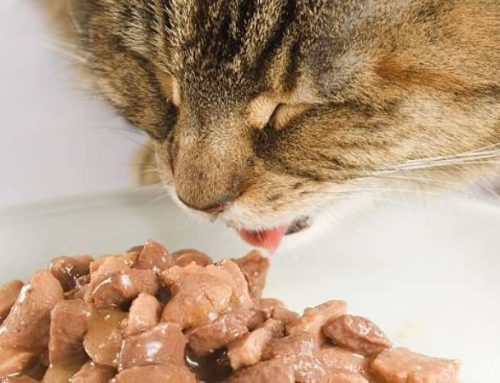Dogs with sensitive stomachs and chronic diarrhea can turn mealtime into a stressful experience for them and for you. Messy accidents, gassy nights, and constant digestive discomfort aren’t just minor annoyances; they’re signs that your pup’s gut health needs attention. Choosing the right food isn’t just about convenience it’s about giving your dog relief, restoring nutrient absorption, and supporting long-term wellness.
In this guide, we’ll explore the best dog foods for sensitive stomachs and diarrhea, including vet-approved dry kibble, canned options, and specially formulated puppy recipes. From limited-ingredient diets to novel proteins like cricket and grub, you’ll discover options that soothe the gut, minimize allergic reactions, and promote healthy digestion. Whether your dog is a finicky adult, a playful pup, or prone to digestive flare-ups, these carefully selected foods can make a measurable difference in their health, comfort, and quality of life.
Vet-Approved Criteria: What Makes a Food “Sensitive Stomach Friendly”?
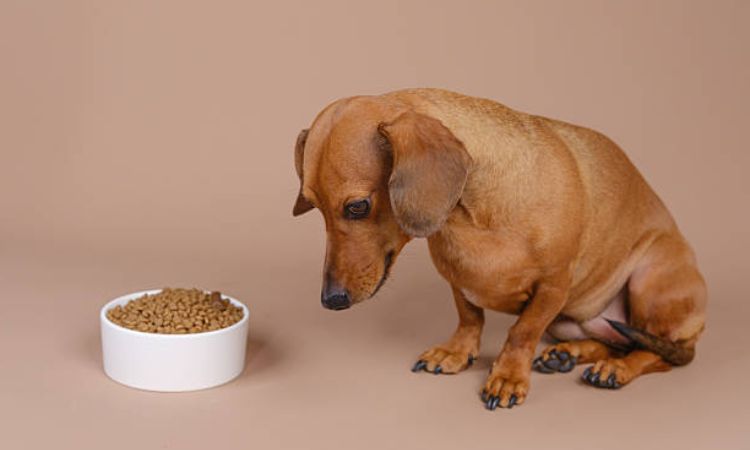
1 High Digestibility: The #1 Factor
The most critical aspect of a sensitive-stomach diet is digestibility. Dogs with sensitive tummies often struggle to break down and absorb nutrients from certain foods. Highly digestible ingredients allow the gut to process food efficiently, reducing the risk of diarrhea, gas, vomiting, or nutrient malabsorption.
What to look for:
- Carbohydrates: Easily digestible options like white rice, sweet potatoes, and regular potatoes are gentle on the stomach and provide a steady source of energy.
- Proteins: Lean, high-quality proteins such as chicken, turkey, lamb, or novel proteins like duck or venison are easier to digest than standard beef or mixed meat blends.
High digestibility not only improves nutrient absorption but also minimizes stress on the gastrointestinal tract, leading to firmer stools, less bloating, and a happier, healthier dog overall.
2 Probiotics and Prebiotics: Supporting Healthy Gut Flora
A balanced gut microbiome is essential for proper digestion. Probiotics are live beneficial bacteria that help maintain healthy intestinal flora, while prebiotics are non-digestible fibers that feed these good bacteria. Together, they support digestive function, strengthen immunity, and reduce inflammation.
Key ingredients for sensitive stomachs:
- Prebiotics: Chicory root, beet pulp, inulin, or psyllium feed beneficial gut bacteria and improve stool consistency.
- Probiotics: Specific strains like Bifidobacterium and Lactobacillus help restore microbial balance and support a healthy digestive tract.
Including both prebiotics and probiotics in a dog’s diet is especially valuable for dogs prone to diarrhea, gas, or post-antibiotic gut imbalance. They help the digestive system recover and maintain long-term stability.
3 Limited Ingredient Diets (LID): Fewer Ingredients, Less Trouble
Dogs with sensitive stomachs or chronic digestive issues often react to common allergens or hard-to-digest ingredients. Limited Ingredient Diets (LID) simplify the formula to reduce potential triggers.
Why it matters:
- Fewer ingredients mean fewer chances of food sensitivities or allergic reactions.
- Focus on a single, novel protein (e.g., salmon, venison, duck) ensures your dog isn’t exposed repeatedly to proteins that can irritate the gut.
- Reduces unnecessary fillers, artificial additives, and common allergens like soy, corn, or wheat, which often contribute to soft stools or vomiting.
LID formulas provide a controlled way to identify and manage sensitivities while still delivering complete, balanced nutrition.
4 Moderate to Low Fat Content: Gentle on the Gut
While fat is an essential nutrient, high-fat diets can be tough on sensitive stomachs. Excess fat slows digestion, can trigger diarrhea, and in some cases, may even lead to pancreatitis in predisposed dogs.
Guidelines for fat content:
- Opt for diets with moderate or low fat, especially for dogs prone to gastrointestinal upset.
- Check the “Guaranteed Analysis” on the label to ensure fat isn’t listed among the first few ingredients, which can indicate high levels.
- Balance is key: enough fat to support energy, skin, and coat health, but not so much that the digestive system is overwhelmed.
Maintaining moderate fat levels in a sensitive-stomach diet helps prevent flare-ups, supports nutrient absorption, and keeps your dog comfortable after meals.
Overall Best Vet-Recommended Formulas (Prescription & Non-Prescription)
1. Royal Canin Gastrointestinal Low Fat (Prescription)
- Key Features: Low-fat formula to reduce digestive stress; highly digestible proteins and rice for gentle nutrition; enriched with soluble fiber to normalize stool.
- Best For: Dogs prone to diarrhea, pancreatitis, or fat-sensitive digestion.
- Why Vets Recommend It: Clinically tested for gastrointestinal support, helps restore intestinal balance, and improves stool quality.
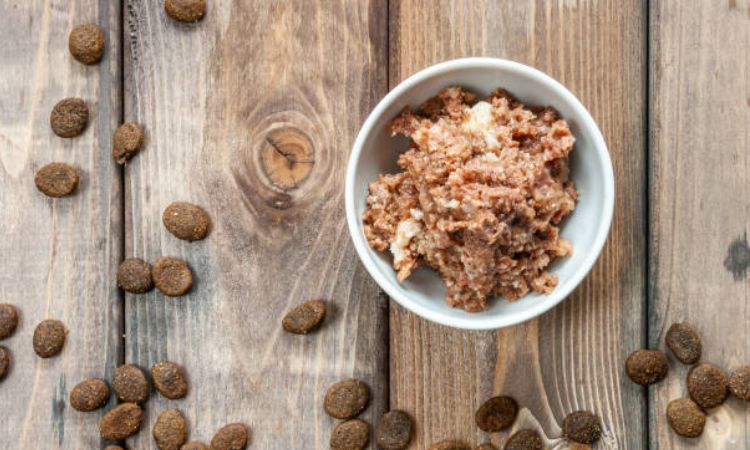
2. Hill’s Prescription Diet i/d Digestive Care (Prescription)
- Key Features: Easily digestible chicken protein; prebiotic fiber blend to support healthy gut flora; antioxidant-rich formula for immune support.
- Best For: Dogs with chronic diarrhea, loose stools, or recovering from gastrointestinal upset.
- Why Vets Recommend It: Backed by clinical research; supports nutrient absorption while easing digestive distress.
3. Purina Pro Plan Sensitive Skin & Stomach (Non-Prescription)
- Key Features: High-quality, lean protein (chicken or salmon); rice-based carbohydrates for gentle digestion; fortified with probiotics for gut health.
- Best For: Dogs with mild sensitivities, occasional diarrhea, or soft stools.
- Why Vets Recommend It: Widely available, palatable, and formulated for sensitive digestion without a prescription.
4. Blue Buffalo Basics Limited Ingredient Diet (Non-Prescription)
- Key Features: Single novel protein sources (like turkey or duck); easily digestible carbohydrates such as potato or pea; free from common allergens (corn, wheat, soy).
- Best For: Dogs with food allergies, intolerances, or chronic sensitive stomach issues.
- Why Vets Recommend It: Minimizes exposure to potential irritants while providing balanced nutrition.
5. Wellness Simple Limited Ingredient Diet (Non-Prescription)
- Key Features: Focused on one protein and one carbohydrate source; enriched with probiotics and antioxidants; no artificial additives.
- Best For: Dogs with known food sensitivities or those prone to diarrhea from complex formulas.
- Why Vets Recommend It: Combines simplicity with digestive support, making it ideal for elimination diets.
Tips for Choosing the Best Formula
- Protein Source Matters: Novel or lean proteins reduce the risk of allergies and are easier on sensitive stomachs.
- Easily Digestible Carbs: Ingredients like rice, sweet potato, or potato are gentle on the digestive tract.
- Probiotics & Fiber: Essential for healthy gut flora and normalized stools.
- Moderate Fat Content: Avoid high-fat diets that may trigger diarrhea or pancreatitis.
- Prescription vs. Non-Prescription: Prescription diets are ideal for chronic or severe cases, while non-prescription sensitive formulas work for mild or intermittent issues.
By selecting a vet-approved, highly digestible formula from this list, you can help your dog regain comfort, stabilize their digestive system, and enjoy healthier stools.
Specific Category Reviews
1 Best Dry Dog Food for Sensitive Stomach and Diarrhea
Dry kibble is a convenient, shelf-stable option for long-term digestive management, particularly for dogs with mild to moderate gastrointestinal sensitivity. When selecting dry food, look for limited-ingredient formulas or foods designed for sensitive digestion, which often contain high-quality proteins, moderate fat, and easily digestible carbohydrates.
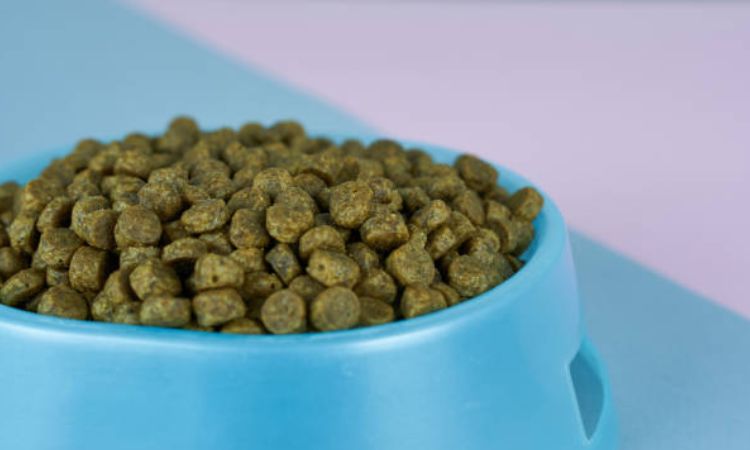
Top Picks:
- Hill’s Science Diet Adult Sensitive Stomach & Skin
- Features highly digestible ingredients, including chicken as the main protein source.
- Includes prebiotic fibers to support gut flora and nutrient absorption.
- Balanced omega-6 fatty acids and vitamin E promote a healthy coat and skin.
- Purina Pro Plan Sensitive Skin & Stomach Adult Dry Dog Food
- Salmon-based protein for reduced allergen risk and high digestibility.
- Contains natural prebiotics and balanced fiber to maintain intestinal health.
- Supports cognitive function with DHA for brain health.
- Blue Buffalo Basics Limited Ingredient Diet
- Single protein source formula (e.g., turkey or fish) with gentle carbohydrates like oatmeal or rice.
- Free from common allergens such as wheat, soy, and corn.
- Added vitamins and minerals support overall digestive and immune health.
Pro Tip: Adding a little warm water or low-sodium bone broth to dry kibble can improve digestibility and moisture intake, especially for dogs prone to mild dehydration during diarrhea. This also helps soften the kibble, making it easier on a sensitive stomach.
2 Best Canned Dog Food for Sensitive Stomach and Diarrhea
Wet or canned food is particularly beneficial for dogs experiencing acute digestive upset, picky eaters, or dogs who require additional hydration. Moisture-rich, low-fat, and highly palatable options can be easier to digest and often allow easier administration of medications or supplements.
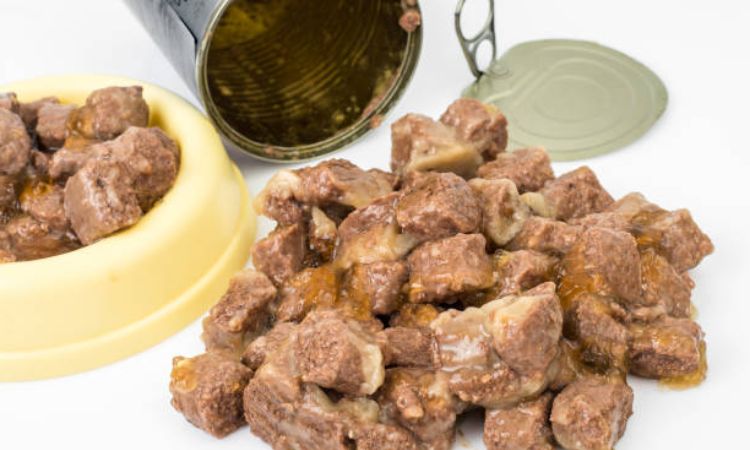
Top Picks:
- Royal Canin Digestive Care Loaf in Sauce
- Specially formulated for sensitive stomachs with highly digestible protein sources.
- Moisture-rich texture promotes hydration and aids digestion.
- Gentle on the stomach, ideal during episodes of diarrhea.
- Hill’s Science Diet Adult Chicken & Barley Entree Canned Food
- High-protein, low-fat formula designed for lean muscle maintenance.
- Contains antioxidants and omega-6 fatty acids for skin and immune support.
- Long-term feeding trials confirm palatability and digestive tolerance.
- Purina Pro Plan Sensitive Skin & Stomach Salmon & Rice Entree
- Fish-based protein lowers the risk of food allergies and digestive upset.
- Natural prebiotic fibers support healthy gut bacteria.
- Easily mix medications, probiotics, or supplements into wet food for administration.
Benefit: Wet food not only aids digestion but is also ideal for mixing in medications or supplements, which can be challenging with dry kibble alone.
3 Best Dog Food for Sensitive Stomach and Diarrhea
Puppies are particularly prone to gastrointestinal upset due to their developing immune systems and digestive tracts. Choosing a highly digestible, balanced puppy formula is crucial to ensure growth, nutrient absorption, and hydration. Puppies experiencing diarrhea are at high risk of dehydration, making veterinary consultation essential.
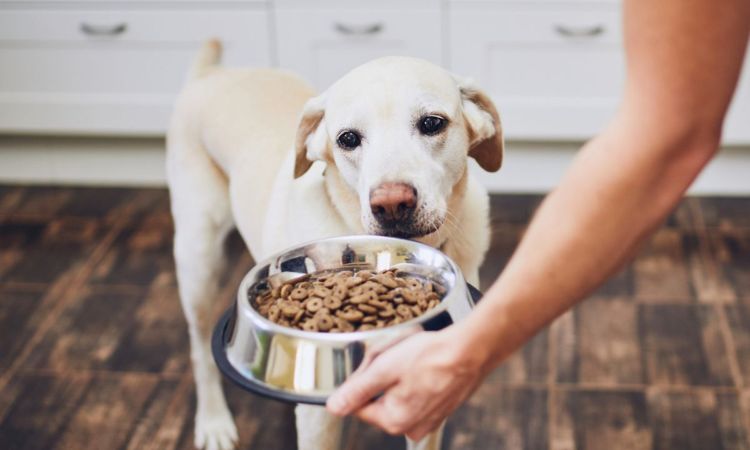
Top Picks:
- Wellness CORE Digestive Health Puppy
- Grain-free, protein-rich formula with added prebiotics and probiotics.
- Supports healthy digestion, immune function, and lean muscle growth.
- Gentle on developing stomachs with limited ingredients.
- Hill’s Science Diet Puppy Sensitive Stomach & Skin
- Specially formulated for sensitive puppies with balanced protein and fiber.
- Supports brain, eye, and skeletal development with DHA and essential vitamins.
- Palatable chicken and rice formula encourages eating in fussy puppies.
- Royal Canin Puppy Gastrointestinal Canned Food
- Highly digestible wet formula for puppies prone to diarrhea or vomiting.
- Enriched with antioxidants, prebiotics, and moderate fat for optimal nutrient absorption.
- Provides hydration during acute digestive upset.
Crucial Warning: Puppies with diarrhea can dehydrate rapidly. Persistent vomiting or loose stools warrant an immediate vet visit. Never delay professional care, and follow a vet-recommended feeding plan to avoid nutritional deficiencies during recovery.
Acute Relief: The Temporary “Bland Diet” (The Diarrhea Fix)
1 How to Fast (Briefly)
For dogs with mild diarrhea, veterinarians often recommend a short-term fast of 12–24 hours. The purpose of this fast is to allow the gastrointestinal tract to rest and reduce ongoing irritation.
Key points:
- Only fast if your dog is otherwise healthy, not a puppy, senior, or dehydrated. Puppies, in particular, can become dehydrated very quickly, so fasting is usually not recommended for them. Always consult your veterinarian first.
- Water must be available at all times. Adequate hydration is critical, as diarrhea can rapidly lead to fluid loss. Some pet parents may offer electrolyte solutions or low-sodium chicken broth to encourage drinking.
- Monitor your dog closely for any worsening symptoms, including lethargy, vomiting, blood in stool, or continued diarrhea. If any of these occur, seek veterinary care immediately.
2 The Bland Diet Recipe
Once the short fast is complete, you can begin introducing a temporary bland diet. The goal is to provide easily digestible, low-fat, gentle foods that help firm stools and reduce gastrointestinal irritation.
Simple staples include:
- Boiled, unseasoned white rice
- Provides a gentle carbohydrate source that is easy on the stomach.
- Helps bind loose stool due to its mild, low-fiber content.
- Plain, boiled lean protein (chicken or turkey)
- Avoid skin, fat, and seasoning to prevent further irritation.
- Provides essential amino acids for energy and muscle maintenance during recovery.
- Canned pumpkin (pure, not pumpkin pie filling)
- Rich in soluble fiber, which can help normalize stool consistency.
- Also supplies vitamins and antioxidants to support digestive health.
Serving tip: Feed small, frequent meals instead of one large portion. This reduces strain on the digestive tract and encourages better absorption of nutrients.
3 Transitioning Back
After 2–3 days on the bland diet, if your dog’s diarrhea is improving, it’s time to slowly reintroduce the chosen commercial sensitive stomach food. A gradual transition reduces the risk of triggering another episode of gastrointestinal upset.
Step-by-step transition:
- Start with 75% bland diet and 25% commercial food for the first 1–2 meals.
- Gradually increase the commercial food portion by 25% every 1–2 days while decreasing the bland diet.
- Continue monitoring stool quality and appetite during the transition. If diarrhea returns or worsens, pause the transition and consult your veterinarian.
Pro Tip: Using a high-quality wet food for the transition can help if your dog is reluctant to eat or needs extra moisture. Wet food also allows you to mix in any medications, probiotics, or supplements recommended by your vet.
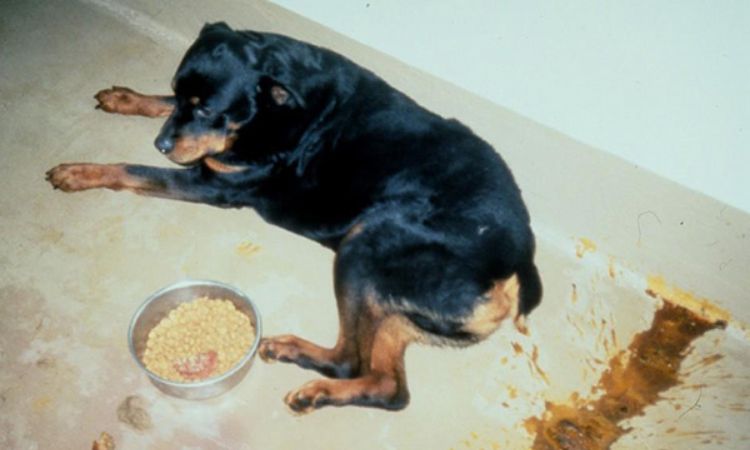
When to See the Vet
While many mild digestive issues in dogs can be managed at home with careful feeding and observation, it’s important to know when professional intervention is necessary. Prompt veterinary care can prevent minor stomach upset from becoming a serious health problem.
Signs That Warrant a Vet Visit
Contact your veterinarian immediately if your dog exhibits any of the following:
- Persistent vomiting or diarrhea lasting more than 24 hours (or more than a few hours for puppies or senior dogs).
- Blood in vomit or stool, which can indicate infection, parasites, or gastrointestinal bleeding.
- Signs of dehydration: sunken eyes, dry gums, excessive panting, or lethargy.
- Sudden loss of appetite combined with lethargy.
- Severe abdominal pain: whining, restlessness, or sensitivity when touched.
- Changes in behavior: confusion, weakness, or unusual aggression.
Special Considerations for Puppies and Senior Dogs
- Puppies: Young dogs are more susceptible to dehydration and nutrient deficiencies. Even a short bout of diarrhea or vomiting can quickly become dangerous. Immediate veterinary consultation is recommended.
- Senior dogs: Older dogs may have underlying health issues (kidney, liver, or heart disease) that can worsen with digestive upset. Vet guidance ensures safe recovery.
Possible Veterinary Interventions
Depending on the severity and underlying cause, a veterinarian may:
- Conduct a physical exam and request stool or blood tests to rule out infections, parasites, or organ dysfunction.
- Prescribe medications to treat inflammation, infection, or nausea.
- Recommend a vet-formulated sensitive stomach diet or prescription gastrointestinal food.
- Provide fluids and electrolytes via IV or subcutaneous injection for dehydration.
Bottom Line
Home management is helpful for mild, short-term diarrhea or vomiting, but persistent or severe symptoms require professional evaluation. Early intervention can prevent complications and ensure your dog recovers quickly and safely.




